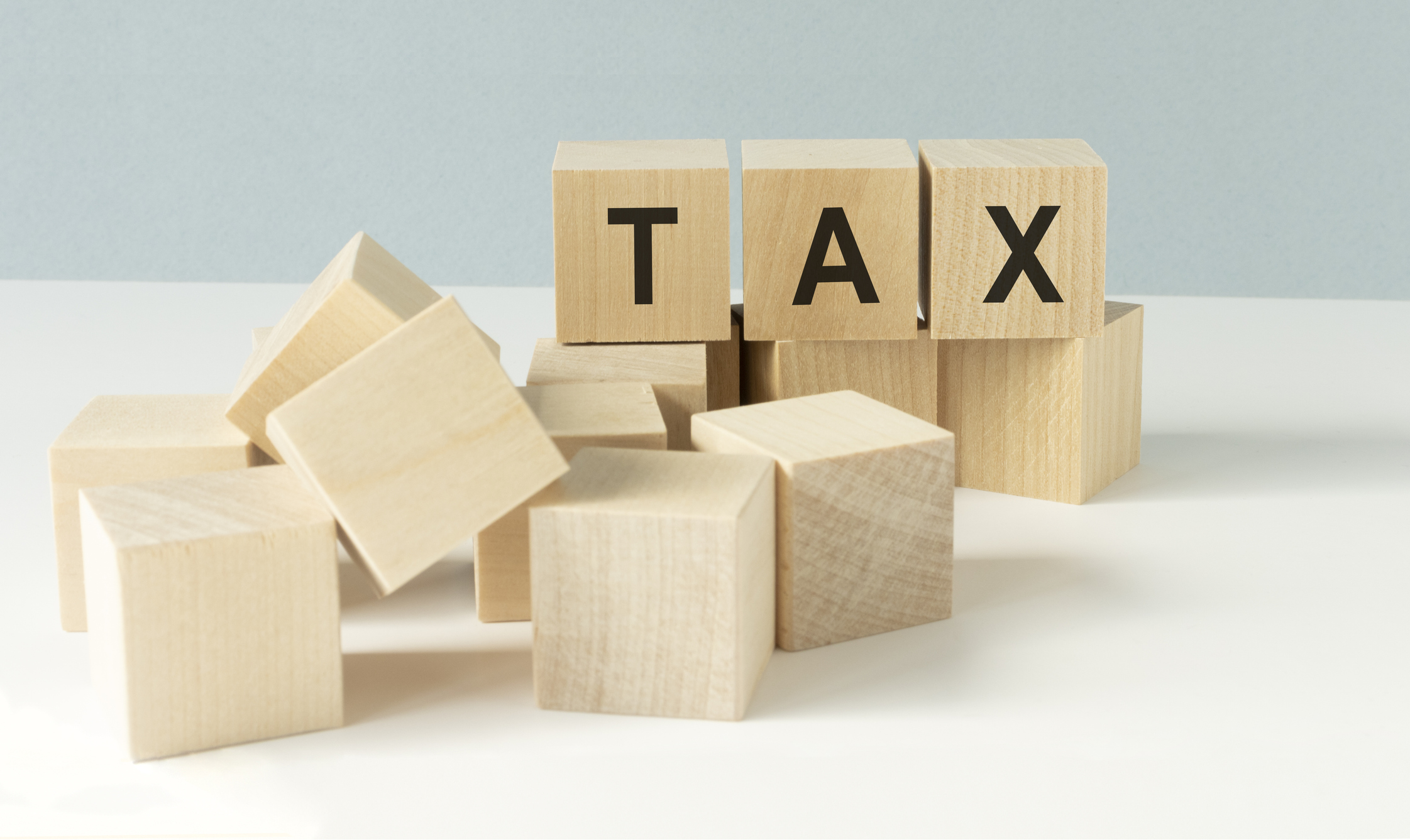Six New Tax Credits in Harris' Economic Plan: What to Know
Presidential nominees, VP Kamala Harris, and former President Trump have proposed several new or expanded tax breaks. Here's what you need to know.


Profit and prosper with the best of Kiplinger's advice on investing, taxes, retirement, personal finance and much more. Delivered daily. Enter your email in the box and click Sign Me Up.
You are now subscribed
Your newsletter sign-up was successful
Want to add more newsletters?

Delivered daily
Kiplinger Today
Profit and prosper with the best of Kiplinger's advice on investing, taxes, retirement, personal finance and much more delivered daily. Smart money moves start here.

Sent five days a week
Kiplinger A Step Ahead
Get practical help to make better financial decisions in your everyday life, from spending to savings on top deals.

Delivered daily
Kiplinger Closing Bell
Get today's biggest financial and investing headlines delivered to your inbox every day the U.S. stock market is open.

Sent twice a week
Kiplinger Adviser Intel
Financial pros across the country share best practices and fresh tactics to preserve and grow your wealth.

Delivered weekly
Kiplinger Tax Tips
Trim your federal and state tax bills with practical tax-planning and tax-cutting strategies.

Sent twice a week
Kiplinger Retirement Tips
Your twice-a-week guide to planning and enjoying a financially secure and richly rewarding retirement

Sent bimonthly.
Kiplinger Adviser Angle
Insights for advisers, wealth managers and other financial professionals.

Sent twice a week
Kiplinger Investing Weekly
Your twice-a-week roundup of promising stocks, funds, companies and industries you should consider, ones you should avoid, and why.

Sent weekly for six weeks
Kiplinger Invest for Retirement
Your step-by-step six-part series on how to invest for retirement, from devising a successful strategy to exactly which investments to choose.
Tax received a lot of attention in the 2024 presidential campaign, particularly following the nationally televised debate between former President Donald Trump, the Republican nominee, and Vice President Kamala Harris, the Democratic nominee.
During the campaign, Harris unveiled an 82-page economic policy platform. The plan contains several proposed tax breaks to address various economic challenges many families and businesses face in the United States.
Harris calls her vision an “opportunity economy.” This “means having enough not just to get by but to get ahead, to be able to build a business, to own a home, to start a family, and to create intergenerational wealth," the Vice President told supporters.
From just $107.88 $24.99 for Kiplinger Personal Finance
Become a smarter, better informed investor. Subscribe from just $107.88 $24.99, plus get up to 4 Special Issues

Sign up for Kiplinger’s Free Newsletters
Profit and prosper with the best of expert advice on investing, taxes, retirement, personal finance and more - straight to your e-mail.
Profit and prosper with the best of expert advice - straight to your e-mail.
Harris economic plan
More recently, in an economic speech delivered in Pittsburg, Pennsylvania, Harris described herself as a capitalist who believes in public/private partnerships and wants to boost domestic manufacturing.
Harris explained if elected, she would do this while supporting middle-class families on issues ranging from housing and grocery costs to childcare and small business financing.
“The cost of living in America is still just too high. You know it, and I know it,” Kamala said to the audience at The Economic Club of Pittsburgh.
Harris described a new way to grow the middle class so that the economy works for everyone and enables people to build generational wealth. She outlined several pillars of her economic plan and said that while she believes in free and fair markets, “companies need to play by the rules.”
“ I want families to not just be able to get by, but be able to get ahead,” Harris said.
Tax credits appear to be a key part of Harris’ vision. Tax deductions and credits can lower your tax burden, allowing you to keep more of your hard-earned money. For some, tax breaks help free up funds for essential expenses and savings or investments in things like education and homeownership.
Here's more of what you need to know.
Related: Kamala Harris Calls for 28% Capital Gains Tax Rate
Kamala Harris tax credits
The following summary highlights tax credits that are part of the Harris campaign platform for the fast-approaching 2024 election.
1. Small business tax deduction: $50,000
Vice President Harris recently unveiled a vision for a new small business tax break during a campaign event in New Hampshire.
"It's essentially a tax cut for starting a small business," the Democratic nominee told supporters.
During the presidential debate, Harris said small businesses are one of her passions. "My mother raised my sister and me but there was a woman who helped raise us. We call her our second mother. She was a small business owner. I love our small businesses... knowing they are part of the backbone of America's economy."
This proposed increased tax deduction would increase the federal incentive for small business startup expenses to $50,000. New business owners can generally deduct up to $5,000 of their first-year qualifying startup costs.
- The existing tax deduction (subject to phase-outs) applies to qualifying costs incurred before the business begins operations, like market research, advertising, employee training, and legal fees.
- Startup expenses beyond the initial deduction can be amortized over 180 months (15 years).
In any case, the deduction is designed to help offset some of the initial costs associated with starting a new business. Data from the e-commerce platform Shopify show the average cost of starting a new small business in the U.S. is around $40,000 in the first full year.
Harris’ proposal would reportedly allow businesses to wait to claim the deduction when they turn a profit.
The Vice President has also mentioned wanting to "cut red tape," suggesting a standard deduction of sorts for small businesses, designed to simplify the tax-filing process.
2. Child tax credit expansion
As Kiplinger has reported, Vice President Harris, if elected, wants to expand the federal Child Tax Credit (CTC). Harris' child tax proposal would reinstate the expanded CTC temporarily implemented during the pandemic, which provided up to $3,600 per child under six years old and $3,000 for older children.
The current CTC for the 2024 tax year is up to $2,000 per eligible child.
- Data indicate that a CTC expansion like this could (as it did during the pandemic) reduce child poverty rates and provide notable support to middle-class families.
- However, the Tax Foundation estimates that the 10-year cost could reach $1.6 trillion.
It’s also worth noting that Harris has called for expanding the Earned Income Tax Credit (EITC) for those with lower incomes who don't have a child in the household. The EITC is an existing credit designed to benefit workers and families with low-to-moderate incomes.
For 2024, for workers without qualifying children, the maximum credit is $600 subject to income limits. Harris has proposed increasing that maximum to about $1,500. She would also likely want to raise the income limit and broaden eligibility criteria.
3. $6,000 child tax credit
Separately, Harris has proposed a tax boost for families with newborns.
During a campaign rally, Harris described the first year of a child’s life as a “vital year of critical development,” adding, "And the cost can really add up, especially for young parents who need to buy diapers and clothes and a car seat and so much else."
Under her proposal, parents of newborns would receive an up to $6,000 tax credit in their child's first year. Harris has said this recognizes the significant expenses associated with welcoming a new child into a family.
"We know that young families need support to raise their children," Harris added during the first presidential debate.
4. Housing tax credits
VP Harris has also proposed several tax credit proposals to address housing affordability.
"We know that we have a shortage of homes and housing, and the cost of housing is too expensive for far too many people," Harris said on September 10.
Home prices and rents have risen faster than incomes in many areas of the country. So more people spend most of their earnings on housing while others are priced out of the market.
- First-Time Homebuyer Credit: A $10,000 tax credit for first-time homebuyers, coupled with downpayment assistance of up to $25,000 for all eligible first-time homebuyers
- Starter Home Construction Credit: An unspecified tax credit for homebuilders of "starter" homes sold to first-time homebuyers to increase the supply of affordable housing
- Low-Income Housing Tax Credit Enhancement: Harris proposes to strengthen this existing credit to encourage the development of affordable rental housing
- Neighborhood Homes Tax Credit: This previously proposed credit would provide a tax incentive for rehabilitating certain homes in distressed areas
5. Premium tax credit
While not a new credit, Harris has proposed an extension of the enhanced Affordable Care Act (ACA) Premium Tax Credit (PTC). This could continue to make health insurance more affordable for some who purchase coverage through the ACA marketplaces. The Harris-Walz campaign says some could save on average $800 a year on their Affordable Care Act health insurance premiums.
The current PTC subsidies and several other key provisions from the 2017 Tax Cuts and Jobs Act (TCJA), involving income tax rates, the standard deduction, and lifetime gift and estate tax exemption, are set to expire at the end of 2025, if Congress doesn't act.
For more information about the TCJA sunset, see Kiplinger's report: How Trump and Harris Might Handle the TCJA Tax Cuts.
6. Job expansion tax credits?
Though specific details weren’t mentioned, Vice President Harris has said she would offer tax credits for employers who expand "union jobs."
The implication is that these "America Forward tax credits" would focus on jobs in steel, iron, and manufacturing communities. According to the Harris campaign policy document, the credits will in part, "reward companies that engage with industry, workers, unions, and communities to protect jobs."
Harris has also said she intends to double the number of registered apprenticeships in the U.S.
Trump tariff plan
Donald Trump’s latest tax proposals would essentially build on his previous tax cuts from the TCJA. He has floated further reducing individual income tax rates and his running mate, Sen. JD Vance has suggested expanding the child tax credit to $5,000.
Trump has said he would increase tariffs to pay for these and other likely tax breaks for corporations. The former President recently pitched the controversial idea of a universal 20% tariff on all imported goods, including one 200% tariff threat and tax incentives for certain domestic businesses.
As Kiplinger has reported, critics warn that tariffs are effectively taxes and Trump's tariff plan could lead to higher prices for consumers.
Trump has also called for ending federal taxes on overtime pay and bringing back the full SALT deduction. (The $10,000 cap on the state and local tax deduction was ushered in during his administration.)
Harris tax plan
Another tax proposal in the Harris plan targeted to lower and middle-income earners is eliminating federal taxes on tips in conjunction with a minimum wage increase and other safeguards.
Republican nominee, Trump has also proposed ending the tax on tips, and most suspect he will support reducing the corporate tax rate.
Of course, Harris or Trump would have to win the presidential election and have a favorable balance of power in Congress to enact any such proposals.
Election 2024
Still, having information on potential policy proposals from both presidential candidates might help inform your vote.
Whichever way you decide, stay informed and keep an eye on existing tax credits and deductions that can help lower your next tax bill.
More on the Election and Taxes
Profit and prosper with the best of Kiplinger's advice on investing, taxes, retirement, personal finance and much more. Delivered daily. Enter your email in the box and click Sign Me Up.

Kelley R. Taylor is the senior tax editor at Kiplinger.com, where she breaks down federal and state tax rules and news to help readers navigate their finances with confidence. A corporate attorney and business journalist with more than 20 years of experience, Kelley has helped taxpayers make sense of shifting U.S. tax law and policy from the Affordable Care Act (ACA) and the Tax Cuts and Jobs Act (TCJA), to SECURE 2.0, the Inflation Reduction Act, and most recently, the 2025 “Big, Beautiful Bill.” She has covered issues ranging from partnerships, carried interest, compensation and benefits, and tax‑exempt organizations to RMDs, capital gains taxes, and energy tax credits. Her award‑winning work has been featured in numerous national and specialty publications.
-
 How Much It Costs to Host a Super Bowl Party in 2026
How Much It Costs to Host a Super Bowl Party in 2026Hosting a Super Bowl party in 2026 could cost you. Here's a breakdown of food, drink and entertainment costs — plus ways to save.
-
 3 Reasons to Use a 5-Year CD As You Approach Retirement
3 Reasons to Use a 5-Year CD As You Approach RetirementA five-year CD can help you reach other milestones as you approach retirement.
-
 Your Adult Kids Are Doing Fine. Is It Time To Spend Some of Their Inheritance?
Your Adult Kids Are Doing Fine. Is It Time To Spend Some of Their Inheritance?If your kids are successful, do they need an inheritance? Ask yourself these four questions before passing down another dollar.
-
 I'm a Financial Adviser: This Is Why I Became an Advocate for Fee-Only Financial Advice
I'm a Financial Adviser: This Is Why I Became an Advocate for Fee-Only Financial AdviceCan financial advisers who earn commissions on product sales give clients the best advice? For one professional, changing track was the clear choice.
-
 Can I Deduct My Pet On My Taxes?
Can I Deduct My Pet On My Taxes?Tax Deductions Your cat isn't a dependent, but your guard dog might be a business expense. Here are the IRS rules for pet-related tax deductions in 2026.
-
 4 Ways Washington Could Put Your Retirement at Risk (and How to Prepare)
4 Ways Washington Could Put Your Retirement at Risk (and How to Prepare)Legislative changes, such as shifting tax brackets or altering retirement account rules, could affect your nest egg, so it'd be prudent to prepare. Here's how.
-
 2026's Tax Trifecta: The Rural OZ Bonus and Your Month-by-Month Execution Calendar
2026's Tax Trifecta: The Rural OZ Bonus and Your Month-by-Month Execution CalendarReal estate investors can triple their tax step-up with rural opportunity zones this year. This month-by-month action plan will ensure you meet the deadlines.
-
 Have You Aligned Your Tax Strategy With These 5 OBBBA Changes?
Have You Aligned Your Tax Strategy With These 5 OBBBA Changes?Individuals and businesses should work closely with their financial advisers to refine tax strategies this season in light of these five OBBBA changes.
-
 IRS Tax Season 2026 Is Here: Big Changes to Know Before You File
IRS Tax Season 2026 Is Here: Big Changes to Know Before You FileTax Season Due to several major tax rule changes, your 2025 return might feel unfamiliar even if your income looks the same.
-
 For High-Net-Worth Retirees, Tax Planning and Estate Planning Are the Main Events
For High-Net-Worth Retirees, Tax Planning and Estate Planning Are the Main EventsTax and estate planning can have far-reaching results for wealthy retirees and are just as important as investment management. This financial adviser explains.
-
 How to Avoid Being Buried by the Tax Avalanche in Retirement: Tips From a Wealth Adviser
How to Avoid Being Buried by the Tax Avalanche in Retirement: Tips From a Wealth AdviserAll that cash you have in tax-deferred accounts could launch you into a higher tax bracket when you start withdrawals. It's time to protect your income.